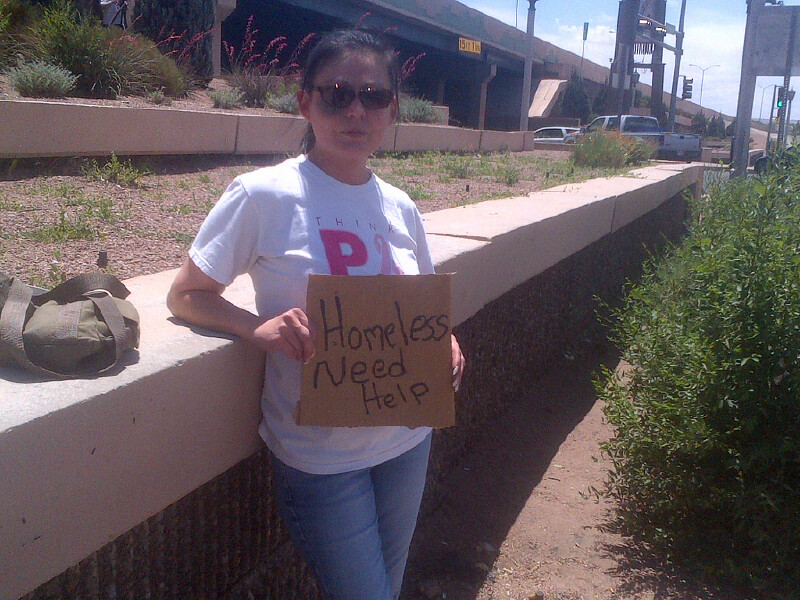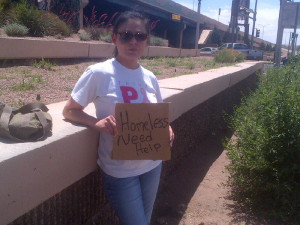By Jeremy Reynalds, Ph.D.
Founder and CEO
Joy Junction Inc.
A new initiative rolled out by the City of Albuquerque on Wednesday is asking people not to give money to panhandlers.
In an astonishing statement attributed to Albuquerque Mayor R.J. Berry by KRQE TV News Berry reportedly said, “If you hand $5 out of your window to a panhandler today, that panhandler can go down to a fast food restaurant and buy a hamburger and fries.”
Instead the city wants people to donate money to the United Way of Central New Mexico. The group will then use the money to feed the hungry, provide shelter for the homeless and help the mentally ill.
In over 30 years of working with New Mexico’s homeless, I have never heard such a statement made by anyone-let alone a public official. While I don’t usually give money to panhandlers, instead preferring to give a fast food gift card, if I was to give cash, I hope they would buy food. No one believes that such a move is a long term solution. So doing is a short term fix designed to keep someone alive until longer term answers can be found.
While we all occasionally hear anecdotal tales about panhandlers who make hundreds of dollars a day (or week-depending on which version you were listening to), the truth is usually very different.
A few months ago, a few of our guests at Joy Junction were willing to share their panhandling experiences with us. One said while she knew people who made a living panhandling, that wasn’t the case for her.
She said her worst time was on her daughter’s birthday.
“I put a birthday pin on her while I panhandled. I spent the money at Dollar Tree and bought her a birthday balloon. I quit panhandling because I wasn’t any good at it. I only made $4.00 on Central, and I knew that I didn’t have what it takes. I’ll never do it again.”
Another person related a sad story about her only time panhandling. She said after her sister died, the family was unable to afford the cost of a burial.
She continued, “I wasn’t working a the time, so I made a big sign asking for donations. My worst experience was a look that a woman gave me when pulled up to the curb next to me. She looked at me like I had dirt on my face.”
However, she did raise $70.00 and a gift card.
Someone else said he had panhandled mostly for food, and occasionally for shelter and clothing.
He said his worst experience was when people are “rude or mean.”
He added, “These experiences just bring me down and I’ll stop for that day, but I’ll have no food (money) for that day.”
However, he admitted, other times are sometimes a lot better and people are willing to help.
He continued, “These kind people understand what I’m going through, but, of course, I have to explain the nature of my problem and they hand me five bucks each time, and some buy me something to eat and throw money on the top. The most that I’ve made on a great day was $200. I had a place for the night; shower and sleep. I also bought healthcare items and clothing.”
This person said he doesn’t panhandle a lot because it’s embarrassing for him to ask for money. “And, I never know what people are going through. We all have problems of our own. But if I do, I always appreciate whatever they help me with and hope that God blesses them.”
Our very own panhandler
Almost two years ago we conducted an experiment where our Kathy Sotelo, my executive assistant at Joy Junction, would stand at a busy intersection – Rio Grande and I40- to panhandle.
We did this so as to experience it firsthand, and have a little better understanding of what those who do it to survive are going through.
A videographer from KAZQ TV 32 also filmed some of Kathy’s experience for inclusion in an infomercial we made that year.
Kathy was wearing jeans, a stained t-shirt, and sneakers. She didn’t wear any makeup, and her hair was in a ponytail.
Unsure what to expect and by the end of her time out there, Kathy said she felt a mix of emotions.
There were several people, women and men alike, who gave her whatever change they could scrounge up before the light turned. Most of them wished her well, while others, Kathy said, “couldn’t bring themselves to say a word.”
Kathy said, “I noticed some people would start looking at me or in my direction anyway, but as soon I would look in their direction, they would look away. I don’t know if guilt, pity, a sense of sadness for me, or any other feeling they may have had, wouldn’t allow them to look at me.”
Kathy said that made her sad. “There I was, a single woman standing 5’1? and weighing all of 110 lbs, and these people wouldn’t even look at me.”
Kathy said that made her sad. “There I was, a single woman standing 5’1? and weighing all of 110 lbs, and these people wouldn’t even look at me.”
A few things disgusted Kathy – specifically those who had “offers” for her besides money or food.
She continued, “I had one in particular who offered to take me home so I could clean his house, and he could ‘do things’ for me in return. I wondered if he thought I was wearing a ‘stupid’ sign on my forehead, and not holding a sign asking for help.”
However, one person will always stick out in her mind, because Kathy said she thought that individual would be the last person to help.
She was beautiful, well dressed and driving an expensive car.
Kathy said, “The moment I saw her I passed judgment in thinking she didn’t care. However, I quickly noticed she was looking through her purse feverishly, rummaging through her center console, to no avail.”
Kathy said she had a frantic look on her face as she tried to find something to give (that’s how it felt to her), and keeping her eye on the light. The light seemed to go from red to green in what felt like an instant.
“The woman made eye contact with me, and I could tell she felt bad she couldn’t help. I must say her taking just a brief moment to make eye contact with me was enough. I felt like she cared, but just couldn’t help.”
Kathy said another woman gave her food from McDonald’s. “She told me they had a special and she couldn’t pass it up, although she didn’t know what she would do with the extra food. She was extremely nice to me and genuinely concerned. She helped the uneasy feeling I was getting out there.”
While some helped and many didn’t or simply couldn’t, others took the time to warn her that she was being watched and filmed.
“I guess that was their way of looking out for me and I appreciated it,” Kathy said.
As we neared the end of our experiment, we noticed an Albuquerque Police Department officer making her way towards us. It turns out somebody took the time to call, and report Kathy.
We had been under the impression that only aggressive panhandling was against the law, not just standing there passively with a sign like Kathy was doing.
We explained to the officer what we were doing, and she told we were wrong-that panhandling of any kind is illegal in the Duke City. Apparently she was wrong and it is indeed
only aggressive panhandling that’s illegal in Albuquerque.
At the end of the day, we walked away with about $14 and food from McDonald’s. All the money was donated to Joy Junction.
To give or not to give?
Because we work with the homeless, we are often asked if it’s okay to give panhandlers money.
We suggest that as opposed to giving money, to give a gift card to a fast food restaurant. At a minimum, recipients will be able to get themselves something to eat.
If you do give money, please do it without condition. Once you’ve given it, don’t worry about how it was spent.
Lastly, a simple hello or eye contact really goes a long way.



